|
|
|
Sort Order |
|
|
|
Items / Page
|
|
|
|
|
|
|
| Srl | Item |
| 1 |
ID:
124766
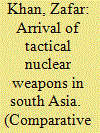

|
|
|
|
|
| Publication |
2013.
|
| Summary/Abstract |
This article examines the arrival of Tactical Nuclear Weapons (TNWs) amid the rapid arms race in South Asia. It analyzes the stability and instability prospects linked to the arrival of and dependence on TNWs. It states that TNW is a murky term that confronts a definitional issue. Although TNW has not been used yet, it entails the risk of its use on the battlefield in the event of a limited war. Conceptually, this sets the stage for an interesting debate on whether or not the arrival of TNWs is stabilizing for the South Asian region, which has confronted many wars and minor border skirmishes during pre- and post-nuclear periods. Since it is viewed that a possible limited military escalation to a nuclear level may not be ruled out and the arrival of TNWs has become a reality, the article concludes that a centralized command and control system bolstered with the non-deployed deterring posture of TNWs is the immediate solution to avert the related worries of pre-delegation, force protection, and the use-or-lose dilemma. It is expected that, learning from their nuclear predecessors, the South Asian nuclear leadership would practice restraint, remain rational, and call for the need of political trust and military reassurances to avert nuclear weapon use.
|
|
|
|
|
|
|
|
|
|
|
|
|
|
|
|
| 2 |
ID:
130443
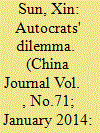

|
|
|
|
|
| Publication |
2014.
|
| Summary/Abstract |
How do authoritarian elections affect voters' attitudes toward the regime and their support for democracy? This article draws upon the case of village elections in China to argue that elections may have two simultaneous effects. First, free and fair elections increase citizens' confidence in the government. Second, elections also allow voters to exercise political rights and accumulate democratic experience through participation, and this in turn may trigger greater demand for further empowerment. Empirical analysis of data from a two-round nationwide survey conducted in 114 villages confirms both effects. One implication of these findings is that competitive elections may simultaneously boost regime popularity and increase public demand for further democratic reform.
|
|
|
|
|
|
|
|
|
|
|
|
|
|
|
|
| 3 |
ID:
120380
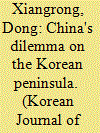

|
|
|
| 4 |
ID:
133033
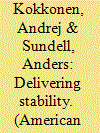

|
|
|
|
|
| Publication |
2014.
|
| Summary/Abstract |
Building a strong autocratic state requires stability in ruler-elite relations. From this perspective the absence of a successor is problematic, as the elite have few incentives to remain loyal if the autocrat cannot reward them for their loyalty after his death. However, an appointed successor has both the capacity and the motive to challenge the autocrat. We argue that a succession based on primogeniture solves the dilemma, by providing the regime with a successor who can afford to wait to inherit the throne peacefully. We test our hypothesis on a dataset covering 961 monarchs ruling 42 European states between 1000 and 1800, and show that fewer monarchs were deposed in states practicing primogeniture than in states practicing alternative succession orders. A similar pattern persists in the world's remaining absolute monarchies. Primogeniture also contributed to building strong states: In 1801 all European monarchies had adopted primogeniture or succumbed to foreign enemies.
|
|
|
|
|
|
|
|
|
|
|
|
|
|
|
|
| 5 |
ID:
090948
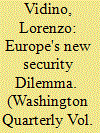

|
|
|
|
|
| Publication |
2009.
|
| Summary/Abstract |
After the September 11, 2001, attacks, governments throughout the world rushed to improve their counterterrorism policies. Several countries tightened legislation, increased resources available to their intelligence and law enforcement agencies, and established repressive policies to uncover and prosecute terrorist networks. Policymakers, fearing an imminent attack, understandably focused their attention on aggressive methods. Yet, over the last few years, many governments have started thinking about more nuanced, comprehensive, and long-term counterterrorism policies, understanding that simply trying to dismantle terrorist networks is like playing a never-ending game of "whack-a-mole," unless steps are also taken to prevent the radicalization of scores of potential new militants.
|
|
|
|
|
|
|
|
|
|
|
|
|
|
|
|
| 6 |
ID:
131339
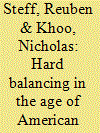

|
|
|
|
|
| Publication |
2014.
|
| Summary/Abstract |
One of the central debates in contemporary international relations scholarship concerns the issue of whether balancing has occurred in response to US-based unipolarity, and if it has, how this should be characterised. Existing research has seen analysts argue that major power responses to unipolarity can be placed in one of either three categories: an absence of balancing, soft balancing, and hard balancing. This article contributes to the scholarly literature by providing a case study of hard internal Russian balancing against the US's development and deployment of Ballistic Missile Defense (BMD) systems during the Bush Administration (2001-08). Russian hard balancing against the US has involved: (1) fielding new strategic nuclear and conventional weapons equipped with BMD countermeasures, and, relatedly, (2) making changes in military doctrine. As a result, security dilemma dynamics are increasingly in evidence in US relations with Russia.
|
|
|
|
|
|
|
|
|
|
|
|
|
|
|
|
| 7 |
ID:
132729
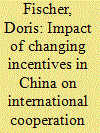

|
|
|
|
|
| Publication |
2014.
|
| Summary/Abstract |
Over the past three decades, China's fast economic development has induced considerable changes in China's university and research institution landscape, research financing and academic career incentives. This paper argues that these changes have affected the motivation and the ways in which Chinese scholars engage in international research cooperation. Most recently it has been observed that strong pressures on scholars and scientists - especially at leading academic institutions - to excel in international publications while simultaneously fulfilling their obligation to generate income for their institutions can lead to a dilemma with regard to international research cooperation: Those institutions and scholars most interesting for foreign scholars to cooperate with may be the ones with the least amount of both incentive and time to enter into serious cooperation. This article invites us to reflect on the implications of these changes in the incentive structure for cooperation in social science research on China.
|
|
|
|
|
|
|
|
|
|
|
|
|
|
|
|
| 8 |
ID:
066284
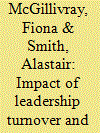

|
|
|
| 9 |
ID:
132286
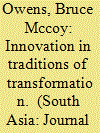

|
|
|
|
|
| Publication |
2014.
|
| Summary/Abstract |
The Newar monastic compounds of the Kathmandu Valley (b?h??s and bah?s) are the centres of what is arguably the world's oldest continuously practised form of Buddhism. This article presents a preliminary analysis of a survey that revisited these compounds 25 years after the publication of John Locke's exhaustive study in order to understand how these fundamental institutions of Newar Buddhism have been affected by the radical transformations that Nepalese society has undergone since then. It suggests that Newar practitioners of the dharma have often expressed their devotion in ways that are at once traditional and vitally innovative, transforming these compounds as well as the means through which they transform them in myriad ways. The conspicuous democratisation of sponsorship of 'repairs' has resulted in alterations that conform to notions of authenticity-old and new, Newar and foreign-as well as deliberate departures from tradition.
|
|
|
|
|
|
|
|
|
|
|
|
|
|
|
|
| 10 |
ID:
131762


|
|
|
|
|
| Publication |
2014.
|
| Summary/Abstract |
This article revisits the security dilemma theory and its application to civil conflict. Based on a careful reading of existing studies, it exposes the deviations from the original theory developed in the 1950s and more recent amendments, which have substantially reduced the explanatory value of the theory. The article shows that when the original and the amended versions of the theory are applied to civil conflict, neither can explain the outbreak of armed conflict. While anarchy might be present as a precondition for the dilemma to operate, a previous history of violent interaction often leaves little room for misperception of intentions. Absent uncertainty about malign intentions toward the other group, the security dilemma theory loses relevance to explain the outbreak of civil conflict.
|
|
|
|
|
|
|
|
|
|
|
|
|
|
|
|
| 11 |
ID:
092443
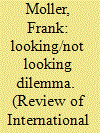

|
|
|
|
|
| Publication |
2009.
|
| Summary/Abstract |
When confronted with images of war and other forms of human suffering, not looking is not an option, not only because we are permanently exposed to images but also because it would not seem to be a morally tenable position. However, looking at images of human suffering is often said to prolong this very suffering and to fix human subjects as victims. Especially when acts of violence have been committed in order to produce images of these very acts the relationship between viewing the images and participating in the acts of violence qua viewer appears to be uncomfortably close indeed. Thus, looking is not an option, either. This article, in the first part, engages with standard criticisms of photography, especially with accusations according to which photographs aestheticise that which they depict and desensitise their viewers. In the second part it discusses Alfredo Jaar's and Jeff Wall's work in order to show possible ways to circumvent the looking/not looking dilemma.
|
|
|
|
|
|
|
|
|
|
|
|
|
|
|
|
| 12 |
ID:
133262
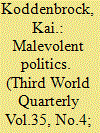

|
|
|
|
|
| Publication |
2014.
|
| Summary/Abstract |
Since the start of reporting during the 'Congo wars' in 1998 the International Crisis Group (icg) has been one of the most important sources of information for Western analysts, UN agencies and ngos dealing with the political and economic challenges of the Democratic Republic of Congo. This article takes a closer look at the way Congolese government politics is analysed in icg reports. It shows that the logics of government and the dilemmas of rule in a country with the size, geography and history of the DRC receive hardly any attention in icg reporting. Building on Klaus Schlichte's approach to the dilemmas of rule, the article argues that President Joseph Kabila has in fact responded skilfully to the dilemmas of elite inclusion across the different hubs of power and wealth from the Kivus to Katanga to the capital Kinshasa. While his political and human rights records are by no means impeccable, not all is rotten in the state of Congo, and the Kabila government deserves more analytical rigor and openness than is offered by the pathologising modes of analysis used by the icg.
|
|
|
|
|
|
|
|
|
|
|
|
|
|
|
|
| 13 |
ID:
130026
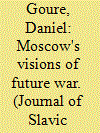

|
|
|
|
|
| Publication |
2014.
|
| Summary/Abstract |
Like the United States and NATO, Russia is struggling to define the future security environment and shape a course to the creation of a relevant and effective military. Russia's strategic vision is of an uncertain, complex and quite dangerous word with threats ranging from internal subversion through intercontinental nuclear exchanges. The Russian military faces an impossible dilemma. It must address a broadening spectrum of prospective conflict scenarios with inadequate resources leading inevitably to the fielding of inadequate capabilities. One reason that Russia clings so tenaciously to nuclear weapons is its recognition that it is the nation's central, even the sole, source of political relevance and military power.
|
|
|
|
|
|
|
|
|
|
|
|
|
|
|
|
| 14 |
ID:
129823
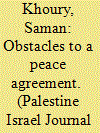

|
|
|
|
|
| Publication |
2014.
|
| Summary/Abstract |
When seriously discussing the fate of the ongoing, everlasting Palestinian-Israeli negotiation, which attempt to reach a peace agreement after decades of conflicts between two people over one historical territory, which I usually refer to as historic Palestine, but which others on the Israeli side may choose to call historic Eretz Israel, analysts are usually face with the dilemma alluded to in the title of this article.
|
|
|
|
|
|
|
|
|
|
|
|
|
|
|
|
| 15 |
ID:
134220
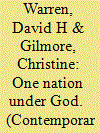

|
|
|
|
|
| Publication |
2014.
|
| Summary/Abstract |
In the wake of the Arab Revolutions of 2011, countries in the Middle East are grappling with how Islamists might be included within a regime of democratic political pluralism and how their aspirations for an "Islamic state" could affect the citizenship status of non-Muslims. While Islamic jurisprudence on this issue has traditionally classified non-Muslims in Islamic society as protected peoples or dhimma, endowed with what the authors term "minority citizenship", this article will examine how the transnational intellectual Wasa?iyya or Centrist movement, of which Sheikh Yusuf al-Qaradawi is the figurehead, have sought to develop a new fiqh of citizenship in which Muslims and non-Muslims have equal civil and political rights. This article will focus on Yusuf al-Qaradawi on the basis that his very recent shift in 2010 on the issue is yet to be studied in depth, as well as in view of the fact that the dilemma faced by reformist Islamic scholars-how to integrate modern concepts into a legal tradition while simultaneously arguing for that tradition's continuing relevance and authority-is for him rendered particularly acute, given that this tradition is itself the very source of his own authority and relevance. It will therefore be argued that the legacy of the Islamic legal tradition structures his discourse in a very specific way, thereby having the potential to render it more persuasive to his audience, and worthy of a more detailed examination.
|
|
|
|
|
|
|
|
|
|
|
|
|
|
|
|
| 16 |
ID:
178964
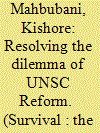

|
|
|
|
|
| Summary/Abstract |
A more ruthless and cunning India can persuade the P5 to stop blocking reform.
|
|
|
|
|
|
|
|
|
|
|
|
|
|
|
|
| 17 |
ID:
091379
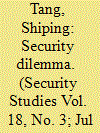

|
|
|
|
|
| Publication |
2009.
|
| Summary/Abstract |
Critically building upon the work of Herbert Butterfield, John Herz, and Robert Jervis, this article advances a more rigorous definition of the security dilemma. It demonstrates critical implications of the rigorously redefined concept. It examines several influential extensions and expansions of the original concept, showing that most have been inaccurate and misleading, and proposes remedies for correcting the mistakes. Finally, it identifies several areas of future research that may yield important new insights into the dynamics of the security dilemma.
|
|
|
|
|
|
|
|
|
|
|
|
|
|
|
|
| 18 |
ID:
130447
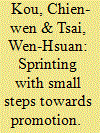

|
|
|
|
|
| Publication |
2014.
|
| Summary/Abstract |
Within the operational procedures of the Chinese Communist Party (CCP) cadre appointment system, age restrictions hinder cadre promotion. As a result, three different methods have emerged to bypass these restrictions, allowing officials to attain faster promotion. These three methods are the Communist Youth League route, temporary transferred duty and non-regulation promotion. This article will explain the age restriction system, and then outline the three methods and discuss their impact on the appointment system as a whole. The examples of Zhou Qiang and Lu Hao, rising political stars, demonstrate how these methods are used to gain substantial age advantages for successful career progression.
|
|
|
|
|
|
|
|
|
|
|
|
|
|
|
|
| 19 |
ID:
130937
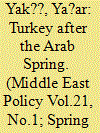

|
|
|
|
|
| Publication |
2014.
|
| Summary/Abstract |
Turkey's attitude regarding developments in the countries affected by the "Arab Spring" varied according to the approach of the ruling Justice and Development Party (Adalet ve Kalk?nma Partisi, AKP) and its perceptions of the countries in question.
In Tunisia, Annahda, a political party that originated from the Muslim Brotherhood (MB) tradition, emerged as the strongest political movement after the fall of the Ben Ali regime. Annahda has an ideological affinity with the AKP, which also has Islamist roots. There is, in addition, a deep-rooted tradition in Tunisia to regard Turkey as a source of inspiration for various reforms. Turkey was, at the beginning of the Arab Spring, referred to by some as a role model. This concept did not acquire much content as time went by, however.
In Libya, Turkey hesitated at the beginning to get involved in the crisis and even wanted to keep NATO out of it.1 Seeing, however, that "a coalition of the willing" was going to intervene with or without Turkey, it made a swift change and participated in the operations with six aircraft and five ships.
When the mainly Shia population of Bahrain wanted to follow the example of the other Arab Spring countries and protest against its Sunni ruler, Saudi Arabia formed a Gulf Cooperation Council (GCC) intervention force, composed mainly of Saudis, and repressed the demonstrations with a ruthlessness comparable to the methods used by the ousted regimes in the other Arab countries. The international community adopted a double standard and kept silent; Turkey went along with this consensus.
Turkey's reaction to the events in Yemen was restrained; it was viewed as a distant country and of low priority on the international agenda. The fact that Saudi Arabia stepped in as the main actor may also have played a role in Turkey's lack of enthusiasm for getting involved more deeply.
|
|
|
|
|
|
|
|
|
|
|
|
|
|
|
|
| 20 |
ID:
132480
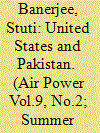

|
|
|
|
|
| Publication |
2014.
|
| Summary/Abstract |
Political instability, economic Volatility, the rise of the right-wing political leadership and an increase in the number of terrorist organisations operating from Pakistan and gaining the support of the Pakistani establishment have nations concerned about the safety of the nuclear assets within Pakistan. Adding to the problem is the well documented proliferation network that has supplied nuclear technology to North Korea, Libya and Iran, with Pakistan, at its centre. These actions have increased the problems and challenges that nuclear proliferation poses. The proliferation of nuclear weapons technology, associated technology and/ or nuclear material to any state or non-state actor, not recognised to receive such technology or material, is one of the most serious dangers to the international security environment. This contributes to not just regional instability and global proliferation, but also increases the risk of violent non-state groups obtaining a nuclear weapon, with a number of violent extremist groups opposed to
India operating from Pakistan. These issues have raised concerns among the international community about the security of Pakistani nuclear weapons. For the United States, Pakistan poses a serious dilemma. Pakistan has been an 'ally' of the United States during the Cold War and continues.
|
|
|
|
|
|
|
|
|
|
|
|
|
|
|
|
|
|
|
|
|